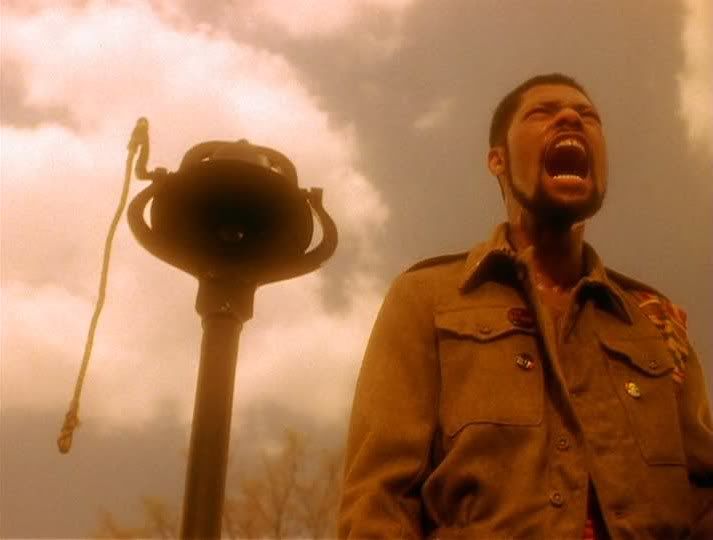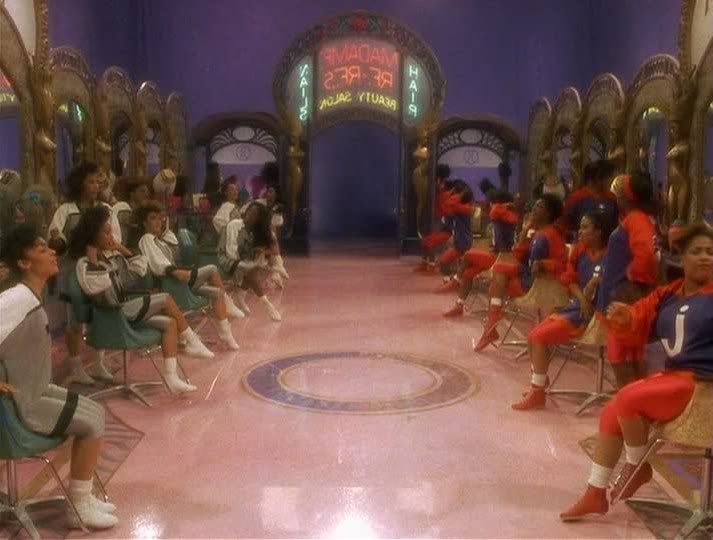
Spike Lee's second feature, School Daze, is a fictionalized reflection of the director's experiences at the historically black Morehouse College, here renamed Mission College. It's a loose-limbed musical satire of various attitudes and types within the black community, especially the conflicts between the politically conscious, radicalized students led by Dap (Laurence Fishburne) and the party animal fraternity Gamma Phi Gamma, led by Julian (Giancarlo Esposito, a weak link in a generally good cast). Dap (and presumably Lee as well) is disgusted by the whole Greek system, which he sees as a repudiation of his own radical activism, a way of involving young black students in inconsequential showmanship rather than something that truly matters. This point is driven home early on when Julian's Gamma Dogs interrupt a rally that Dap is giving to convince the university to divest its holdings in South Africa, since ironically Mission has been lagging behind white colleges in sending that anti-apartheid message. The Gamma Dogs, including Dap's cousin Half Pint (Lee), barge onto the scene, distracting from Dap's oratory with their goofy, ridiculous antics and pointless histrionics.
For Dap, and for Lee, the Gamma Dogs represent the subjugation of black male identity, particularly by the military. The Gamma Dog initiation rites, like those of many fraternities, involve the pledges acting in emasculating ways, but there's an especially degrading component to the way Julian has the pledges act like dogs, dragged around on chains by the accepted frat members, barking, eating dog food from dog bowls, and engaging in militaristic rituals. This imagery resonates with the history of slavery, putting black men in chains and teaching them to obey authority, to willfully humiliate themselves in public. Later, during a sex scene between Julian and his girlfriend Jane (Tisha Campbell), she licks his fraternity brand; he's willingly branded himself the way slaves were once branded by their masters. The Gamma Dogs' chain of command and the military discipline they impose on pledges also suggests a connection with the military, as though they're preparing these young black men for a life of obeying orders, submitting to their superiors, and sacrificing their self-respect in order to be accepted into society.
The conflict between Dap and Julian extends to their respective girlfriends, Rachel (Kyme) and Jane. Jane is a member of the Gamma Rays, the organization of the Gamma fraternity's girlfriends, and they're very different from Rachel and her friends. Lee stages a musical number set in a hair salon, dramatizing the conflict between the glammed-up Gamma Rays and the politically conscious, Afrocentric women associated with Dap's activist crew. The Gamma Rays are seen as the women who want to be white, with generally lighter skin, poofed-up hair and even, in at least one case, blue contact lens. They're contrasted against the women who have darker skin and who don't try to hide or change their nappy hair. Lee stages this conflict between different conceptions of racial identity like something out of West Side Story, a break in the reality of the film that recasts this battle of ideas in frenzied choreography.

This is the only musical number in the film that really breaks the diegesis. The rest of the film's music is posed as actual performances as a part of frat rituals, parties and school rallies. Some of the music is wince-inducingly saccharine, which might be intentional, especially as juxtaposed against the soulful gospel number that accompanies the opening credits' black-and-white photos from the history of civil rights. At one point, Lee cuts between Dap and Rachel having sex and a lame song being performed at the Gammas' party, drawing an implicit contrast between this whitewashed music and the passionate relationship of this couple who shun the Gammas' frivolity. Other performances, like the chants incorporated into the Gamma Dog initiations, are grating and annoying by design. The point is, much of the music in the film seems intended more to deliver an idea or underscore a polemical distinction than to simply exist as good music. As interesting as the film is in terms of the ideas it's exploring and the racial hot buttons it's fearlessly pushing, it kind of fails as a musical because the music is so secondary to the politics.
Even if a lot of the musical numbers are unsatisfying — a dance party towards the end of the film seems to drag along forever with little purpose or effect — the film remains an interesting early sign of Lee's preoccupations and the brash style he's crafted to explore the sensitive areas of race and intra-race politics. What's interesting about the film is that, though Lee is unquestionably on Dap's side in this debate between African identity politics and frat bro ignorance, he doesn't entirely let Dap off the hook. Dap's arguments with Rachel push him to think about his approach to women and to question his own judgmental tendencies, like his distrust of lighter-skinned black people, a form of racism as insidious as when the judgment flows in the opposite direction. Even more provocatively, there's a scene where some local men (led by Samuel L. Jackson in an early role) confront Dap and his friends, revealing that they see Dap much as Dap himself sees the Gammas: as wannabes, trying to be something they're not by educating themselves. It's the extreme version of Dap's ideology, as regressive as the Gammas' desire to assimilate and ignore their heritage, and Lee's inclusion of this scene complicates the simple dichotomy that exists in the on-campus scenes.
The film ends with a jarring, fourth-wall-breaking sequence that abruptly all but dispenses with the narrative in favor of a literal "wake up" call, with Dap running around the campus, screaming for everyone to "wake up." This summons is directly addressed to the audience far more than it is to the film's characters, who seem to suddenly and passively accept Dap's wisdom after rejecting him throughout the film. It's not a narratively believable or satisfying ending — Julian's sudden reawakening in the finale is especially unconvincing — but it doesn't seem like it's meant to be: after the Gamma Dogs' antics reach a truly despicable climax that reveals their abysmal attitude towards women, some kind of "wake up" call was obviously needed. Dap's turn to the camera explicitly implicates the audience in the behavior they've just seen, forcing those watching to think about which roles they'd inhabit, which side they'd choose.

4 comments:
I've always loved this early Spike Lee as it deals very hosestly with aspects fo the African-American experience that never come up in movies. This is about us arguing among ourseleves and traditionally there's been a "Don't let the white people see this" taboo about exploring such subjects. With great glee and gstor Spike upends this.
Here's the great "Straight and Nappy" number. That it's a genuine song and dance number (reminiscent of such pocket msuicals as Give AGirl A Break, My Sister Eileen and I Love Melvin) sets it apart from the more presentational songs in the film. But I like many of these other numbers, especially the one by the late great Phyllis Hyman.
That Spike "breaks the fourth wall" at the end underscore his interest in Brecht -- which sadly he hasn't returned to.
I completely agree that the film fails as a musical, because the music is actually second to the politics. I like this film well enough, but his best work was yet to come in DO THE RIGHT THING, MALCOLM X and BAMBOOZLED. The film does admirably explore the aspect of differences among similarly black-skinned students, which of course is noted for it's universality.
I'd like to see this again in the near future though, as I saw only once when it was released in the theatre. Brilliant review.
The differecne is that they don't see themselves as 'similarly black-skinned" at all. The great but sadly short-lived Frank's Place dealt with this even more sharply in an episode dealign the notorious "brown paper bag test."
David, I knew you liked this one more than I did. For me, as Sam says below, Spike is Do the Right Thing and Bamboozled and maybe a couple of others. This film is definitely interesting, though, and as you say it's a very unique look at ideas and elements of African-American life that don't often make it into the movies.
Sam, agreed, I actually think I'd have liked it more if there were more full-on musical numbers like the one in which the girls fight.
Post a Comment